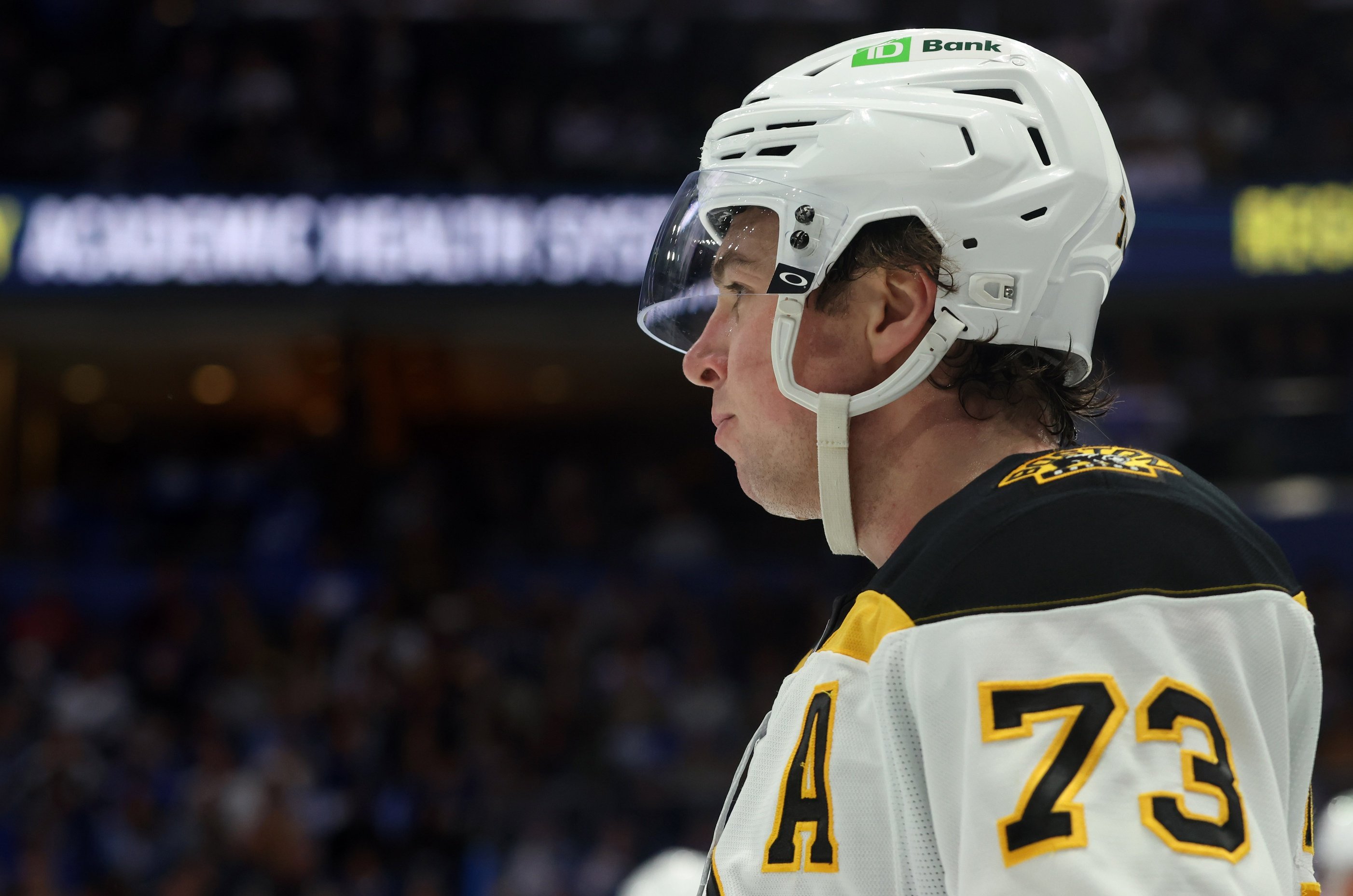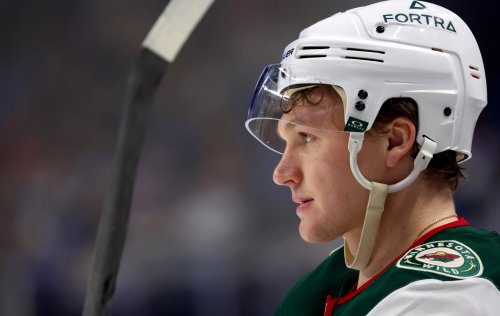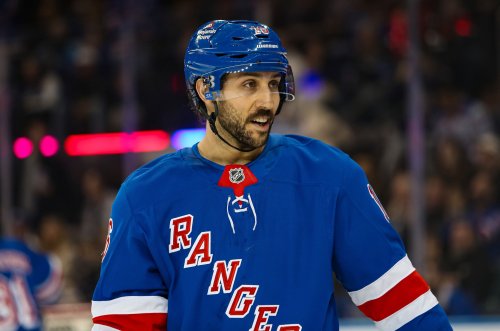
On Thursday afternoon, hours before Team USA faced off against Canada in the 4 Nations Face-Off final, Charlie McAvoy posted a picture of him leaving Massachusetts General Hospital on Instagram. In the picture, he’s driving while listening to Lynyrd Synyrd’s “Free Bird.”
The good news is McAvoy will watch Team USA play at TD Garden in Boston; the bad news is he won't play in the game.
On Wednesday, the Boston Bruins announced that McAvoy received treatment for an AC joint separation in his shoulder and a subsequent infection. According to SportsNet’s Elliotte Friedman, the Bruins are “extremely unhappy” with how the Minnesota Wild's medical staff treated McAvoy’s injury.
The Bruins are concerned about McAvoy's treatment, partly because he’s one of their better players. Wild fans should follow this development closely because Minnesota has suffered multiple injuries to impact players this season, and another NHL club has expressed consternation with their medical staff.
Bill Guerin is Team USA’s general manager, and he’s reportedly using the Wild’s staff to treat players. McAvoy, Boston’s star defenseman, is Team USA’s alternate captain and best defenseman. The Bruins believe McAvoy suffered the injury in Team USA’s opener against Finland on Thursday. However, his condition worsened after he logged 19:27 of ice time against Canada on Saturday.
“From what I understand, on Monday, he was in a bit more pain and was admitted to the hospital, and they realized the injury was more severe than believed or initially diagnosed,” Friedman said on Sportsnet 590 The Fan. “And No. 2, there was an infection there that had to be operated on and removed. So, I don’t know if he was given a needle or shot or something like that, and it got infected, but it was something along these lines.”
Adding to the confusion, Bruins general manager Don Sweeney, who is also the general manager of Team Canada, made the announcement that McAvoy wouldn't play. Team Canada’s general manager would not be able to say that one of Team USA’s players is out in, say, the Olympics or other international tournaments. However, this is an NHL tournament, and the NHL regular season resumes on Saturday.
“I remember yesterday when it was the Bruins and not Team USA that announced that McAvoy was out, there were people saying, ‘How come the Bruins, whose GM is the GM of Team Canada, are announcing that Charlie McAvoy wouldn’t play?’” Friedman continued. “And then it became pretty clear that it’s because the Bruins were extremely unhappy with the way this had been handled and that they felt that in this particular case, McAvoy didn’t get the proper care.”
The NHL replaced its All-Star Game with the 4 Nations Face-Off, and over 10 million people tuned in to watch Team USA’s first game against Canada. 4.4 million people watched ESPN’s broadcast, peaking at 5.2 million, similar to Stanley Cup ratings. SportsNet in Canada produced similar numbers.
However, the tournament occurs in the middle of the NHL season, so the Bruins will resume pursuing a playoff spot without McAvoy. Similarly, the Vegas Golden Knights will resume play without defenseman Shea Theodore, who suffered an injury playing for Team Canada against Sweden on February 12. Boston is one point out of a playoff spot in the Eastern Conference, while Vegas is second in the Pacific division.
The status quo of glorified East-West exhibitions typical of past All-Star games was never going to get 4 million viewers. The players didn’t take those games seriously, so it wasn’t entertaining. However, they also didn’t get hurt.
Part of the entertainment of the 4 Nations Face-Off is that the players are playing as hard as they would in the Olympics. The drawback is that they risk injury and are subject to whatever doctors their national teams have in place, rather than their NHL team’s medical staff.
The 4 Nations Face-Off has been a boon for the Wild. It has allowed Joel Eriksson Ek a reset on the national stage, and Matt Boldy has performed in high-pressure situations. Still, imagine if one of them had gotten hurt. Or if Russia and Austria were playing in the tournament, and Minnesota lost Kirill Kaprizov or Marco Rossi during it.
However, the more significant takeaway for the Wild, who resume play on Saturday at 11:30 am in Detroit, is whether they should be concerned about their medical staff. Minnesota has suffered injuries to crucial players this season, including Kaprizov, Brock Faber, and Jonas Brodin. Injuries and illness piled up in early January, creating adversity for a team that was battling the Winnipeg Jets for first place in the Central Division at Thanksgiving.
“Seriously, you truly can’t make up what’s gone on with the Wild the past several weeks,” Michael Russo wrote in a January 9 piece detailing Minnesota’s injury situation. “Every time they get one player back, two more go down, and they’re usually their most key guys.”
No medical staff can keep an entire roster healthy. However, the Wild allowed Eriksson Ek to return to a playoff series with a broken leg against the Dallas Stars in 2023. An injury that seemed minor in December had Kaprizov miss a month, then play three games in January, only to get shut down for at least a month to have surgery.
Players are stubborn and want to play. However, messaging and clear communication can keep injured players off the ice.
It’s difficult for the public to understand player injuries because the league reports them as upper- and lower-body injuries, and people outside the organization are not privy to the dialogue between team doctors and the players. However, Friedman’s reporting about Boston’s concerns with the Wild’s medical staff is concerning. Teams don’t criticize other team doctors lightly, and injuries have been a large part of Minnesota’s narrative this season.
The Bruins acquired Pat Maroon from Minnesota in March last season, and 98.5 The Sports Hub’s Ty Anderson reported that the Wild allowed Maroon to resume skating before the trade. Boston had greater concerns about his health and delayed his debut until April 13. The Bruins were upset after making the trade. Fans in Minnesota might also have some consternation about it, especially considering that the Wild have occasionally returned their star players to the ice too early.
Think you could write a story like this? Hockey Wilderness wants you to develop your voice, find an audience, and we'll pay you to do it. Just fill out this form.
-
 1
1







Recommended Comments
Join the conversation
You can post now and register later. If you have an account, sign in now to post with your account.
Note: Your post will require moderator approval before it will be visible.